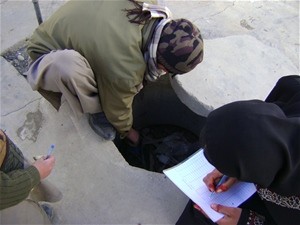
The brother and sister team of meter readers records the water usage of a customer in Ghazni province.
USAID/CAWSA
A team of USAID-supported meter readers improves water service delivery in Ghazni.
9 FEBRUARY 2010 | GHAZNI, AFGHANISTAN
Providing clean running water is an essential city service. The U.S. Government is assisting four provincial water supply departments in Afghanistan to improve their productivity and financial performance. Ultimately, the departments will become self-sustaining commercial enterprises that can expand services and provide safe drinking water to Afghan citizens.
In Ghazni, USAID’s Commercialization of Afghanistan Water and Sanitation Activity (CAWSA) program, implemented by the International City/County Management Association (ICMA), is working with the Ghazni Water Supply Department (GhWSD) to improve services. Until recently, there was only one meter reader for 819 meters serving almost 1,500 customers, and the GhWSD has been operating at a financial loss. In the three-month period ending in December 2009, customer payments covered less than 30 percent of the cost of water supply operations.
Mohammad Azim Muslim Jar, director of the GhWSD, believed that hiring a female meter reader would improve collection efficiency. In Ghazni’s cultural context, a woman would have access to household meters during times when only other women are at home. This change would avoid the need for frequent return trips to read meters. With USAID support, he hired and trained a brother-and-sister team to take on this responsibility.
The new meter readers set out to enhance revenue collection, identify and report illegal connections, motivate customers to pay on time, and encourage non-customers to apply for new connections. In addition to meeting ambitious initial performance targets, the meter readers identified five illegal water connections. These connections were legalized, and the new customers paid a total of 65,484 Afs ($1,310) to the GhWSD to compensate for past service.
In the first month of their tenure, the meter readers collected record revenues of 482,000 Afs ($9,640). This is a 75 percent increase over the prior month and covered 52 percent of operating costs. It is an excellent first step on the road to sustainable commercial operations and better water supply service for the people of Ghazni.







Comment
Make a general inquiry or suggest an improvement.